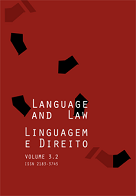Addressing Linguistic and Cultural Issues in American Criminal Cases
Resumo
This article traces the development of court interpreting in the United States. It is now a profession, with training and certication available. Nevertheless, there is a clear unevenness in the quality and availability of interpreters, especially for rare languages. This article provides some sense of what interpreting is – and isn’t – and which tasks interpreters nd most dicult. The author relates how he began to work as an interpreter in the 1970s, and he explains his current work as an expert witness. A person who needs an interpreter sometimes also needs an expert, either to explain foreign words, customs and attitudes, to challenge substandard police interpreting, or to establish that the defendant was unable to say in English what he or she allegedly said. Evidence is now often in languages other than English, and an expert is needed if warnings were not understood or statements were not properly translated.Downloads
Publicado
16.01.2017
Como Citar
O'Laughlin, M. (2017). Addressing Linguistic and Cultural Issues in American Criminal Cases. Language and Law Linguagem E Direito, 3(2). Obtido de http://84.247.136.72/ojsletrasX/index.php/LLLD/article/view/1751
Edição
Secção
Artigos/Articles
Licença
Este trabalho está licenciado com uma Licença Creative Commons - Atribuição-NãoComercial 4.0 Internacional.







